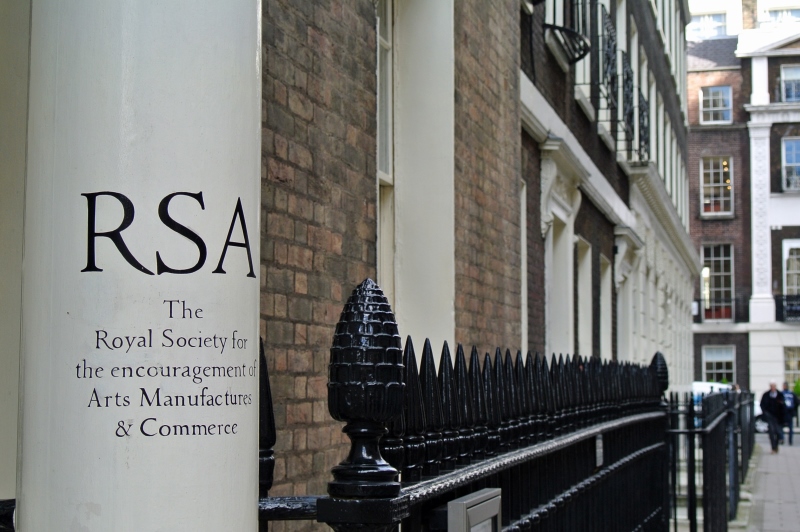Following the ascendance of Matthew Taylor to Chief Executive of the RSA (Royal Society for the Encouragement of the Arts, Manufacturing and Commerce) there has been a move to engage with new information technologies to facilitate the Society’s activities. The most significant manifestation to date was the RSA Conference The Social Impact of the Web: Society, Government and the Internet in London, at which I spoke. (See my comments on the Social Impact of the Web panel.) Having presented at the RSA I have an invitation to become a Fellow, which I am holding off taking up as I have concerns about the Society’s apparent reluctance to support real debate around controversial issues.

Taylor is being advised by, among others, Steve Moore of Policy Unplugged [dead], who kindly proposed me for the aforementioned panel. (See Taylor’s related post mentioning Moore’s role: Very many networks [dead].) RSA Fellow and social media consultant David Wilcox (Designing for Civil Society) has been pushing for the Society to embrace social media in a bottom-up re-invention of the RSA, harnessing its collective intelligence towards more contribution and joint action. He and Moore helped convene a discussion at the University of Westminster on 9 July (hosted by Ian Delaney of NMK [dead]). Following my contribution to that meeting I have formalised my thoughts, which derive to some extent from my observations on the Social Impact of the Web panel:
We are all interested in making a difference in the world in some way. We also have some practical needs. Social media tools may facilitate both, as may the RSA (institution/network/physical space), and there may be some overlap. But we should be wary of ‘the man with a hammer…’ syndrome, ie: having solutions looking for problems. Social media tools are often wielded in search of a problem. In fact, we are still playing with them. We don’t even have a model of knowledge sharing using them, as I noted, which is indicative of a lack of seriousness and application.
The characteristics of the RSA that might usefully be brought to bear (in order of importance) are: 26,000 wise, knowledgeable, well-connected and well-disposed Fellows; non-partisan influence in general, and through Matthew Taylor in particular; connection to an intelligent and influential audience, through the events programme, local groups, the RSA Journal and the RSA site; resources, both financial, intellectual (such as the library), and practical (how to make things happen); spaces for formal and informal meeting, working, networking and dining.
I am still not clear what kinds of projects (both practical and intellectual) people might want to pursue, though a few suggestions were made at the meeting. It currently feels as if we have privileged access to some tools and want to play with them, pushing form over content. This is symptomatic of the RSA’s approach since the Manifesto Challenges [dead] were issued: limited debate and questioning, maximised action. But action that isn’t well informed, is pursued with blinkers on, or is un-reflected upon, will tend to be of diminished value.
Following that meeting, an Open RSA London [dead] group has been created on Facebook. I am not clear whether my observations (originally posted to the Facebook discussion that lead to the meeting) have had any impact on this initiative. For now, I will hold a watching brief.
Also and originally published at spy.typepad.com.

I think your words of warning are wise and important, but a period of inexpensive experimentation and flirtation with some of these tools doesn’t really do any harm and might actually do a lot to help reveal what the real needs, problems and advantages are. I didn’t mention it on Monday, but I think Ning might have been a better place to start than Facebook. Still – let’s wait and see.
In response to Ian’s comment: I agree that experiementation can’t do any harm. However, one needs to be clear about what one wants to achieve if one is to use one’s time effectively. One also needs to think aout the scenarios in which, in this case, RSA Fellows of all ages, interests and technical dispositions might use these tools.
Nico – I see the Open RSA Facebook group as a quick way to get some interested – and of course interesting – people communicating and getting to know each other. Once we have more of a sense of who we are we really do need to focus, as you say, on what we might jointly or severally want to do. I tend to jump to tools and action …. I’m reminding myself relationships before ideas, ideas before action. I hope you will keep pushing on this.
I get the impression that the RSA is very PC and too liberal/left
In response to David Wilcox, I note that the Facebook experiment to date has not been a notable success, and it is hard to point to any achievements. My impression is of many people trying to start diverse conversations without much response (though the RSA Website – What do Fellows want? topic has had valuable responses). This may be a function of the Facebook model, or a function of the lack of thinking about effective communication and communication design. Or it may be a result of the lack of clear objectives to cohere and guide debate and action. For me, I am interested in informed debate, and there is certainly no more of that. (And to Jeremy Jacobs: the RSA has a fairly fixed view, but I wouldn’t describe it as liberal/left as today those terms lack meaning.) And for now I still hold a watching brief.